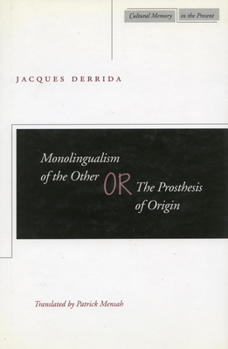Monolingualism of the Other Or, the Prosthesis of Origin
Select Format
Select Condition 
Book Overview
"I have but one language--yet that language is not mine." This book intertwines theoretical reflection with historical and cultural particularity to enunciate, then analyze this conundrum in terms of the author's own relationship to the French language. The book operates on three levels. At the first level, a theoretical inquiry investigates the relation between individuals and their "own" language. It also explores the structural limits,...
Format:Paperback
Language:English
ISBN:0804732892
ISBN13:9780804732895
Release Date:August 1998
Publisher:Stanford University Press
Length:112 Pages
Weight:0.35 lbs.
Dimensions:0.4" x 5.4" x 8.3"
Customer Reviews
4 ratings
A meditation on language and culture
Published by Thriftbooks.com User , 22 years ago
"Monolingualism of the Other; or, The Prosthesis of Origin," by Jacques Derrida, is a compelling blend of autobiographical material and cultural criticism. Originally published in French in 1996, the text has been translated into English by Patrick Mensah. According to a note at the beginning of the book, a shorter, different version of the text was delivered orally at a colloquium at the Louisiana State University, Baton Rouge, in 1992.In the book, Derrida reflects on his past as an Algerian Jew living under French colonialism. He raises questions about language politics, personal identity, cultural domination, the notion of a "mother tongue," and the idea of "metalanguage." He reflects on the practical mechanics of French colonial administration in Algeria, and on Algeria's Jewish population: "a disintegrated 'community,' cut up and cut off." He also discusses his own problematic relationship with the French language.I found "Monolingualism of the Other" absolutely gripping. Although Derrida's prose (as translated by Mensah) sometimes strikes me as convoluted to the point of obscurity, I often found Derrida's style to be elegant, even poetic, and very accessible. But be warned: if you're intimidated by phrases like "ontico-ontological re-mark," "a pre-egological ipseity," or "the hegemony of the homogeneous," the book may be a bit much to take.But many will, I believe, tear into this challenging text with gusto. I believe that the issues raised by Derrida in this book are relevant to many other cultural phenomena: the debate over Black English, the political and literary recognition of creole and pidgin languages, the ongoing efforts to preserve the Celtic languages, etc. If you have a serious interest in these and related issues, I strongly recommend this book.
French as a site of at once Identification and Resistance
Published by Thriftbooks.com User , 24 years ago
The book, inheriting and deviating the previous ones of Jacques Derrida. It contains multi-layer of signification or 'inter-textuality' as Kristeva suggests in Revolution in Poetic Language. In the first stance, French is a materialistic of identification. In the second, it'a a point of resistance and rebellion. For, the linguistic characteristic of French as to Derrida possesses the significance of racial discrimination, cultural hegemony and 'grand narrative' covertly. The aforesaid is mainstream of his discourse within this book. Of course, hereby some ideologies and the problematic of migration and agony of in-between identification are left behind.
Language functions as a site of polyphony
Published by Thriftbooks.com User , 24 years ago
Jacques Derrida, as well as in his other oeuvres, builds up a negative or reflective meditation upon language. Hereby, he bears a family resemblance to Michel Foucault. The book is elaborating a polyvocal phenomenon, involving the problematic of language, identity, psychic identification, cultural hegemony ( a target of verbal attack in his discourse). Besides, it sketches out the ideology behind the scene, that is, the agony of in-between identification in the Algerian Jew. It is a rich and illuminating work that can be applied to censor the phenomena of "diaspora," "citizenship," migration and so forth in our contemporary epoch.
Short, but important
Published by Thriftbooks.com User , 25 years ago
This book goes a long way to connect Derrida's intellectual/philosophical concerns with his life. Reading this book might provide the personal matter that is absent from his more famous (and more frequently cited) books and might bring to light the reasons for his interventions into philosophy. A must read for anyone thinking about the relationship between autobiography and language.





